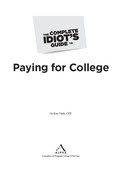Keeping Your Eye on Taxable Aid
Many people rightfully wonder how financial aid is treated for tax purposes. After all, having a school or an organization hand you tens or even hundreds of thousands of dollars can seem like too much money for the government to not try to grab a slice of. Thankfully, most financial awards are tax-free, but you need to keep your eyes on some notable exceptions.

CHEAT SHEET
Money received as part of a tuition assistance program provided by your employer is considered tax-free, up to an annual dollar limit ($5,250 in 2009). Because any amount above this is considered taxable income, smart students often delay taking additional classes that would result in assistance above that limit until a new calendar year starts. In doing so, they avoid paying taxes on the excess amount.
The single biggest factor that affects the taxability of a financial aid award is whether the student is working toward a recognized degree. Financial aid for programs that only lead to certificates or are from schools other than recognized colleges or vocational schools will likely be considered taxable aid, regardless of how the money is used.
If the student is working toward a legitimate degree or to acquire job skills and the school is an accredited institution, financial aid and award money used for the following expenses are most likely tax-free:
• Tuition
• Fees
• Books
• Supplies
However, if upon receiving the money, the student uses it for something else, it would be considered taxable income. Financial aid and award money used for the following expenses is subject to income taxation:
• Room
• Board
• Travel
• Research activities
The Least You Need to Know
• The American Opportunity Tax Credit (AOTC) can put up to $2,500 back into most undergraduate students’ pockets.
• The Lifetime Learning Credit is a great back-up credit for those who don’t qualify for the AOTC.
• The IRS does not allow double-dipping on tax credits and benefits, so don’t try to claim more than one for the same student.
• Don’t overlook opportunities to deduct the cost of college on your state income tax return.
• Take advantage of tax-free and tax-favored withdrawals from Section 529 plans, Coverdell ESAs, and U.S. savings bonds.
..................Content has been hidden....................
You can't read the all page of ebook, please click here login for view all page.
